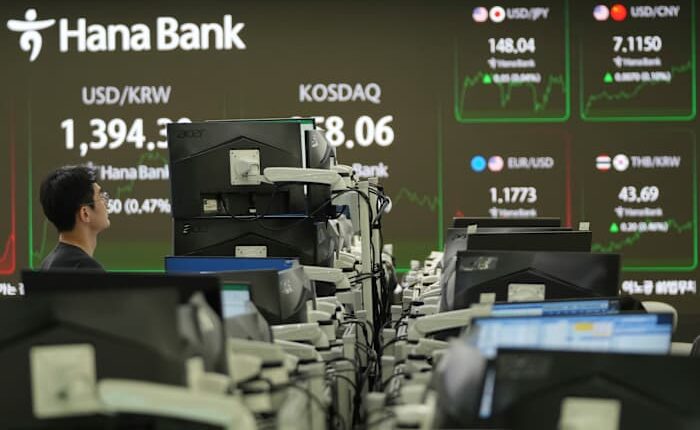Share this @internewscast.com

MANILA – Asian shares mostly retreated Friday after a rally of technology stocks led by Nvidia and Intel pushed Wall Street to more records.
Japan’s Nikkei 225 experienced fluctuations, ultimately ending the day down by nearly 0.6% at 45,045.81, following the Bank of Japan’s decision to maintain its short-term interest rate steady at 0.5%. Additionally, recent data indicated that Japan’s yearly inflation in August decreased to a 10-month low of 2.7%, down from 3.1% in the previous month.
In China, the markets showed slight movements, with Hong Kong’s Hang Seng index dipping less than 0.1% to 26,537.97 and the Shanghai Composite index dropping slightly, also under 0.1%, to 3,829.34. Investors were anticipating a phone conversation later in the day between President Donald Trump and China’s President Xi Jinping to discuss tariffs and finalize an agreement concerning TikTok’s continued operation in the U.S.
Australia’s S&P/ASX 200 climbed 0.3% to 8,773.50 after losses a day earlier, when data indicated the jobs market was showing signs of softness.
South Korea’ Kospi fell nearly 0.5% to 3,445.24. India’s BSE Sensex edged down 0.6%, trimming earlier gains. Taiwan’s Taiex dipped 0.7%.
On Wall Street, significant gains were noted on Thursday, primarily led by Nvidia and Intel in a rally within the tech sector, sparked by their joint announcement of a deal involving a $5 billion investment.
The S&P 500 increased by 0.5%, heading towards a third consecutive winning week. The Dow Jones Industrial Average rose by 124 points, or 0.3%, while the Nasdaq composite surged by 0.9%. All three indexes reached new record highs.
Intel saw a remarkable 22.8% jump—its best performance since 1987—after Nvidia announced its plan to purchase $5 billion worth of Intel’s stock. This investment is part of a broader strategy where the two companies will collaborate on creating products for data centers and personal computing. Nvidia saw a 3.5% increase, significantly driving the S&P 500 upward, owing to its status as Wall Street’s most valuable firm.
Meanwhile, positive economic reports contributed to rising Treasury yields in the bond market. Notably, one report revealed that fewer Americans filed for unemployment benefits last week than had been anticipated.
That could indicate the pace of layoffs is slowing, and it was a relief after the prior week’s data showed a disconcerting leap to a four-year high. The job market has slowed so much that the Federal Reserve on Wednesday cut its main interest rate for the first time this year in order to give it some help.
The Fed also indicated more cuts may be on the way, though Chair Jerome Powell warned that the Fed is in a precarious position and may have to change course quickly. That’s because the economy is in an unusual situation where the job market is slowing while inflation is remaining stubbornly high at the same time.
The Fed is in charge of fixing both, but it has only one tool to do so. And helping one by moving interest rates often hurts the other in the short term.
Expectations are high on Wall Street that the Fed will keep cutting interest rates, and an unexpected halt could send stocks tumbling. Critics say stock prices have already shot too high and become too expensive, in part because of heavy bets on continued cuts in rates.
On Wall Street, smaller stocks led the way. They can be some of the biggest beneficiaries of easier interest rates, and the Russell 2000 index of small stocks rallied 2.5% to join its bigger rivals in setting all-time highs. It topped its prior record, which was set in 2021.
In other dealings on Friday, benchmark U.S. crude lost 24 cents to $63.02 per barrel. Brent crude, the international standard, shed 17 cents to $66.75 per barrel.
The U.S. dollar slid to 147.83 yen from 147.92 yen. The euro slipped to $1.1768 from $1.790.
Copyright 2025 The Associated Press. All rights reserved. This material may not be published, broadcast, rewritten or redistributed without permission.









